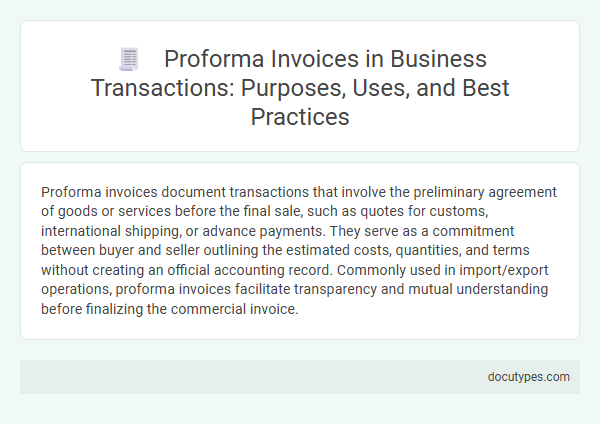Proforma invoices document transactions that involve the preliminary agreement of goods or services before the final sale, such as quotes for customs, international shipping, or advance payments. They serve as a commitment between buyer and seller outlining the estimated costs, quantities, and terms without creating an official accounting record. Commonly used in import/export operations, proforma invoices facilitate transparency and mutual understanding before finalizing the commercial invoice.
Introduction to Proforma Invoices
Proforma invoices serve as preliminary bills sent to buyers before the final sale is confirmed. They outline the details of the transaction, providing transparency and clarity for both parties involved.
These documents are frequently used in international trade and complex transactions to specify costs, quantities, and terms before shipment or delivery.
- Quotation and Price Confirmation - Proforma invoices are used to present prices and terms to buyers before an official sale agreement.
- Customs Documentation - They help importers and exporters declare goods for customs clearance in advance.
- Advance Payment Requests - Sellers use proforma invoices to request deposits or partial payments before fulfilling the order.
Defining Proforma Invoice in Business Context
| Defining Proforma Invoice in Business Context | |
|---|---|
| Proforma Invoice | A preliminary bill of sale sent to buyers before the delivery of goods or services. It outlines the expected costs and terms but is not a demand for payment. |
| Which Transactions Are Documented with Proforma Invoices? | |
| Export Shipments | Used to declare the value of goods for customs purposes prior to shipping internationally. |
| Order Confirmations | Serves as an initial agreement on pricing and product details before finalizing sales contracts. |
| Quotation and Pricing Estimates | Provides customers with a detailed cost estimate for budgeting and approval before purchase. |
| Advance Payment Requests | Documents expected payment amounts when deposits or upfront fees are required before delivery. |
| Non-binding Sales Transactions | Records potential sales agreements without legally binding the parties to payment or delivery. |
| You rely on a proforma invoice to outline transaction terms clearly, facilitating smoother communication and financial planning. | |
Key Purposes of Proforma Invoices
Proforma invoices document preliminary sales transactions, providing an estimated cost before the final sale is confirmed. They serve as a formal commitment ensuring that the buyer understands the expected charges and product details.
Key purposes of proforma invoices include facilitating customs clearance and securing import licenses. These documents also assist buyers in arranging financing or budgeting prior to actual shipment or delivery.
Common Uses of Proforma Invoices in Transactions
Proforma invoices are commonly used in international trade to provide a preliminary bill of sale before the final transaction occurs. They document the estimated costs of goods or services, allowing buyers to arrange financing or import permits. These invoices facilitate clear communication of terms, pricing, and delivery details during negotiations and shipment preparations.
Proforma Invoice vs. Commercial Invoice
Proforma invoices document preliminary transaction details, primarily used for customs declarations and buyer approval before the final sale. They differ from commercial invoices, which serve as the official record of sale and include completed transaction information for payment and shipping. Proforma invoices do not demand payment, whereas commercial invoices require payment completion and act as proof of the actual transaction.
Essential Elements of a Proforma Invoice
Which transactions are documented with proforma invoices? Proforma invoices are used to outline the details of a sale before the final transaction takes place. They provide an estimate of goods or services, often used for customs or pre-payment purposes.
What are the essential elements of a proforma invoice? A proforma invoice must include the seller's and buyer's details, description of goods or services, quantities, prices, and estimated total costs. It also contains terms of sale, shipping information, and validity date for the offer.
Legal Implications of Proforma Invoices
Proforma invoices are used to document preliminary transactions before final sales agreements are made. They serve as a formal quote and outline the terms of a potential sale without constituting a legal obligation to deliver goods or services.
- Pre-Shipment Documentation - Proforma invoices outline the estimated cost, quantity, and specifications of goods before shipment occurs.
- Customs Clearance Usage - Authorities use proforma invoices to assess duties and taxes on imported goods prior to actual invoicing.
- Legal Non-Binding Nature - Proforma invoices do not create a binding contract or demand payment; they act as informational documents only.
Understanding the legal implications of proforma invoices helps avoid misunderstandings in international trade and contract law.
Best Practices for Creating Proforma Invoices
Proforma invoices document preliminary transactions, often used for quoting prices before final sales agreements. These invoices detail products, quantities, and estimated costs without serving as official demand for payment.
Best practices for creating proforma invoices include clear item descriptions and precise pricing to avoid misunderstandings. You should ensure all relevant terms, such as delivery dates and payment methods, are explicitly stated to facilitate smooth transactions.
Proforma Invoice in International Trade
Proforma invoices play a crucial role in international trade by documenting preliminary sales agreements before the final sale occurs. These documents provide a detailed estimate of the goods or services to be delivered, outlining terms and conditions for customs and payment purposes.
- Export Transactions - Proforma invoices are used to declare the value and details of goods being shipped internationally to comply with customs regulations.
- Quotation and Pre-Sale Agreements - They serve as a formal offer to buyers, allowing you to confirm the transaction terms before the actual sale is completed.
- Customs Clearance - They assist in securing necessary import licenses and facilitate smooth customs clearance by specifying shipment details and values accurately.
Which Transactions Are Documented with Proforma Invoices? Infographic

